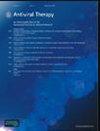Comparative outcomes of lopinavir/ritonavir and hydroxychloroquine for the treatment of COVID-19 with mild-to-moderate severity: A retrospective observational study
IF 1.3
4区 医学
Q4 INFECTIOUS DISEASES
引用次数: 1
Abstract
Background Lopinavir/ritonavir (LPV/r) and hydroxychloroquine (HCQ) are both being used to treat coronavirus disease 2019 (COVID-19), but their relative effectiveness is unknown. The purpose of this study was to compare the clinical outcomes of patients treated for COVID-19 with LPV/r or HCQ. Methods A retrospective observational study was conducted at 2 hospitals in Busan, South Korea, where approximately 90% of COVID-19 patients were hospitalised during February/March 2020. All patients aged ≥15 years that were hospitalised with mild or moderately severe COVID-19 received LPV/r or HCQ as their initial treatment and were included in the analysis. Results Among the 72 patients with mild-to-moderate disease severity on admission, 45 received LPV/r and 27 received HCQ as their initial therapy. A higher proportion of the LPV/r group had pneumonia on admission (LPV/r, 49% vs HCQ, 15%), but there were no other significant differences in the demographic or clinical characteristics between groups. Switching therapy due to clinical failure was significantly more common in the HCQ group than in the LPV/r group (41% [11/27] and 2% [1/45], respectively, P = .001). Disease progression was also significantly more common in the HCQ group than in the LPV/r group (44% [12/27] and 18% [8/45], respectively, P = .030). Conclusion Based on our study results, HCQ shows no apparent advantage compared to LPV/r for preventing progression to severe disease in patients with COVID-19.洛匹那韦/利托那韦与羟氯喹治疗轻至中度COVID-19的疗效比较:一项回顾性观察研究
背景洛匹那韦/利托那韦(LPV/r)和羟氯喹(HCQ)均用于治疗2019冠状病毒病(新冠肺炎),但其相对有效性尚不清楚。本研究的目的是比较接受LPV/r或HCQ治疗的新冠肺炎患者的临床结果。方法在韩国釜山的2家医院进行回顾性观察性研究,2020年2月/3月期间,约90%的新冠肺炎患者住院。所有因轻度或中度新冠肺炎住院的年龄≥15岁的患者均接受LPV/r或HCQ作为初始治疗,并纳入分析。结果在72例入院时病情较轻至中度的患者中,45例接受LPV/r治疗,27例接受HCQ治疗。LPV/r组入院时有肺炎的比例较高(LPV/r,49%vs HCQ,15%),但两组之间的人口统计学或临床特征没有其他显著差异。HCQ组因临床失败而进行的转换治疗明显比LPV/r组更常见(分别为41%[11/27]和2%[1/45],P=0.001)。HCQ组的疾病进展也明显比LPV/r组更普遍(分别为44%[12/27]和18%[8/45],P=.030)。结论根据我们的研究结果,与LPV/r相比,HCQ在预防新冠肺炎患者进展为严重疾病方面没有显示出明显优势。
本文章由计算机程序翻译,如有差异,请以英文原文为准。
求助全文
约1分钟内获得全文
求助全文
来源期刊

Antiviral Therapy
医学-病毒学
CiteScore
2.60
自引率
8.30%
发文量
35
审稿时长
4-8 weeks
期刊介绍:
Antiviral Therapy (an official publication of the International Society of Antiviral Research) is an international, peer-reviewed journal devoted to publishing articles on the clinical development and use of antiviral agents and vaccines, and the treatment of all viral diseases. Antiviral Therapy is one of the leading journals in virology and infectious diseases.
The journal is comprehensive, and publishes articles concerning all clinical aspects of antiviral therapy. It features editorials, original research papers, specially commissioned review articles, letters and book reviews. The journal is aimed at physicians and specialists interested in clinical and basic research.
 求助内容:
求助内容: 应助结果提醒方式:
应助结果提醒方式:


